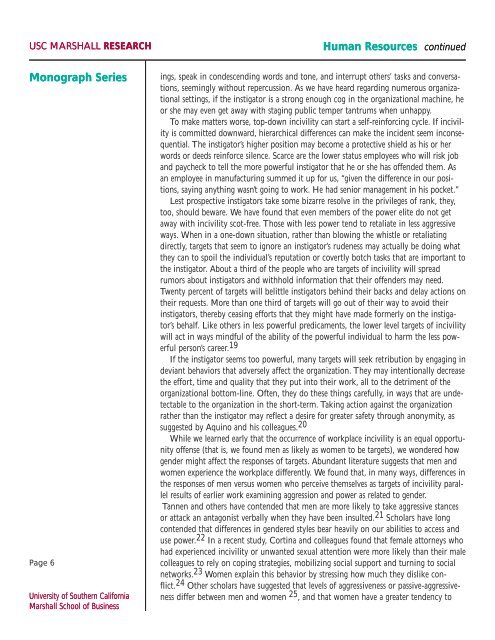On the Nature, Consequences and Remedies of Workplace Incivility
On the Nature, Consequences and Remedies of Workplace Incivility
On the Nature, Consequences and Remedies of Workplace Incivility
You also want an ePaper? Increase the reach of your titles
YUMPU automatically turns print PDFs into web optimized ePapers that Google loves.
USC MARSHALL RESEARCH Human Resources continued<br />
Monograph Series<br />
Page 6<br />
University <strong>of</strong> Sou<strong>the</strong>rn California<br />
Marshall School <strong>of</strong> Business<br />
ings, speak in condescending words <strong>and</strong> tone, <strong>and</strong> interrupt o<strong>the</strong>rs’ tasks <strong>and</strong> conversations,<br />
seemingly without repercussion. As we have heard regarding numerous organizational<br />
settings, if <strong>the</strong> instigator is a strong enough cog in <strong>the</strong> organizational machine, he<br />
or she may even get away with staging public temper tantrums when unhappy.<br />
To make matters worse, top-down incivility can start a self-reinforcing cycle. If incivility<br />
is committed downward, hierarchical differences can make <strong>the</strong> incident seem inconsequential.<br />
The instigator’s higher position may become a protective shield as his or her<br />
words or deeds reinforce silence. Scarce are <strong>the</strong> lower status employees who will risk job<br />
<strong>and</strong> paycheck to tell <strong>the</strong> more powerful instigator that he or she has <strong>of</strong>fended <strong>the</strong>m. As<br />
an employee in manufacturing summed it up for us, “given <strong>the</strong> difference in our positions,<br />
saying anything wasn’t going to work. He had senior management in his pocket.”<br />
Lest prospective instigators take some bizarre resolve in <strong>the</strong> privileges <strong>of</strong> rank, <strong>the</strong>y,<br />
too, should beware. We have found that even members <strong>of</strong> <strong>the</strong> power elite do not get<br />
away with incivility scot-free. Those with less power tend to retaliate in less aggressive<br />
ways. When in a one-down situation, ra<strong>the</strong>r than blowing <strong>the</strong> whistle or retaliating<br />
directly, targets that seem to ignore an instigator’s rudeness may actually be doing what<br />
<strong>the</strong>y can to spoil <strong>the</strong> individual’s reputation or covertly botch tasks that are important to<br />
<strong>the</strong> instigator. About a third <strong>of</strong> <strong>the</strong> people who are targets <strong>of</strong> incivility will spread<br />
rumors about instigators <strong>and</strong> withhold information that <strong>the</strong>ir <strong>of</strong>fenders may need.<br />
Twenty percent <strong>of</strong> targets will belittle instigators behind <strong>the</strong>ir backs <strong>and</strong> delay actions on<br />
<strong>the</strong>ir requests. More than one third <strong>of</strong> targets will go out <strong>of</strong> <strong>the</strong>ir way to avoid <strong>the</strong>ir<br />
instigators, <strong>the</strong>reby ceasing efforts that <strong>the</strong>y might have made formerly on <strong>the</strong> instigator’s<br />
behalf. Like o<strong>the</strong>rs in less powerful predicaments, <strong>the</strong> lower level targets <strong>of</strong> incivility<br />
will act in ways mindful <strong>of</strong> <strong>the</strong> ability <strong>of</strong> <strong>the</strong> powerful individual to harm <strong>the</strong> less powerful<br />
person’s career. 19<br />
If <strong>the</strong> instigator seems too powerful, many targets will seek retribution by engaging in<br />
deviant behaviors that adversely affect <strong>the</strong> organization. They may intentionally decrease<br />
<strong>the</strong> effort, time <strong>and</strong> quality that <strong>the</strong>y put into <strong>the</strong>ir work, all to <strong>the</strong> detriment <strong>of</strong> <strong>the</strong><br />
organizational bottom-line. Often, <strong>the</strong>y do <strong>the</strong>se things carefully, in ways that are undetectable<br />
to <strong>the</strong> organization in <strong>the</strong> short-term. Taking action against <strong>the</strong> organization<br />
ra<strong>the</strong>r than <strong>the</strong> instigator may reflect a desire for greater safety through anonymity, as<br />
suggested by Aquino <strong>and</strong> his colleagues. 20<br />
While we learned early that <strong>the</strong> occurrence <strong>of</strong> workplace incivility is an equal opportunity<br />
<strong>of</strong>fense (that is, we found men as likely as women to be targets), we wondered how<br />
gender might affect <strong>the</strong> responses <strong>of</strong> targets. Abundant literature suggests that men <strong>and</strong><br />
women experience <strong>the</strong> workplace differently. We found that, in many ways, differences in<br />
<strong>the</strong> responses <strong>of</strong> men versus women who perceive <strong>the</strong>mselves as targets <strong>of</strong> incivility parallel<br />
results <strong>of</strong> earlier work examining aggression <strong>and</strong> power as related to gender.<br />
Tannen <strong>and</strong> o<strong>the</strong>rs have contended that men are more likely to take aggressive stances<br />
or attack an antagonist verbally when <strong>the</strong>y have been insulted. 21 Scholars have long<br />
contended that differences in gendered styles bear heavily on our abilities to access <strong>and</strong><br />
use power. 22 In a recent study, Cortina <strong>and</strong> colleagues found that female attorneys who<br />
had experienced incivility or unwanted sexual attention were more likely than <strong>the</strong>ir male<br />
colleagues to rely on coping strategies, mobilizing social support <strong>and</strong> turning to social<br />
networks. 23 Women explain this behavior by stressing how much <strong>the</strong>y dislike conflict.<br />
24 O<strong>the</strong>r scholars have suggested that levels <strong>of</strong> aggressiveness or passive-aggressiveness<br />
differ between men <strong>and</strong> women 25 , <strong>and</strong> that women have a greater tendency to


